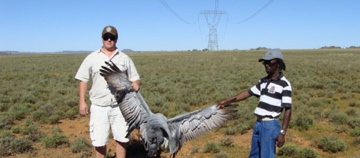
Electrocution and fatal collisions with power lines are largely preventable cause according to a UN Review. The casualty numbers are 10's of millions with larger birds particularly victims, in just the African-Eurasian region and migratory routes. Large birds migrating across the region - pelicans, storks, flamingos, cranes and owls - seem to be more affected. The Review warns that such "populations may be significantly declining, which could lead to local or regional extinction. In South Africa, for example, 12 per cent of blue cranes – the country’s national bird – are dying every year due to collisions with power lines."
There are over 70 million kilometers of lines expected to grow by 2015 by another 6 million. According to the review, electrocution generally happens in open habitats lacking natural perches or nesting trees for birds such as steppes, deserts and wetlands. But collisions occur in every habitat type in the region, especially in areas where large numbers of birds congregate, such as migration corridors or small islands. (Read: Saving Wildlife Pathways" -
diplomaticallyincorrect.org/films/blog_post/saving-wildlife-pathways-by-ambassador-mo/41969 ).
Preventive/Remedial Measures:
Reports outlined in the review present recommendations for governments, electric power companies, and conservation organizations to reduce the impact of power grids on birds. “The international guidelines present a number of appropriate legislative and policy actions and some creative technical measures on how to mitigate and reduce the vast number of unnatural bird mortalities caused by electricity power grids,” according to Elizabeth Maruma Mrema, Executive Secretary of the Convention on the Conservation of Migratory Species of Wild Animals (CMS).
UNEP point to the potential and current effectiveness of underground cabling, which has already been done in countries such as the Netherlands and in certain parts of Belgium, the United Kingdom, Norway, Denmark and Germany. However, this method is expensive, making it unfeasible to implement in the entire African-Eurasian region. Other less expensive measures include insulating dangerous electric parts of the lines and installing bird-friendly perching and nesting devices as well as markers or bird flight diverters in overhead wires.“Electrocution of birds is not just a conservation issue. It also has economic and financial consequences, as power interruptions and the resulting need for reparations from outages are often caused by bird electrocutions,” said Ms. Mrema.
Link to UNEP Review:
www.unep.org/newscentre/Default.aspx?DocumentID=2659&ArticleID=8957&l=en
By Ambassador Muhamed Sacirbey
Facebook Become a Fan – “Diplomatically Incorrect”
Twitter Follow us - DiplomaticallyX
More at Ecology-Diplomat -
diplomaticallyincorrect.org/c/ecology-diplomat/most_recent/1

